

Lexical hypothesis - Wikipedia. The lexical hypothesis[1] (also the fundamental lexical hypothesis,[2] lexical approach,[3] or sedimentation hypothesis[4]) is one of the most widely used hypothesis in personality psychology.[5] Despite some variation in its definition and application, the Lexical hypothesis is generally defined by two postulates.
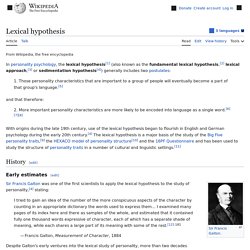
The first states that those personality characteristics that are most important in peoples' lives will eventually become a part of their language. History[edit] Early estimates[edit] Sir Francis Galton was one of the first scientists to apply the lexical hypothesis to the study of personality,[4] stating: I tried to gain an idea of the number of the more conspicuous aspects of the character by counting in an appropriate dictionary the words used to express them... Despite Galton's early ventures into the lexical study of personality, over two decades passed before English-language scholars continued his work.
Psycholexical studies[edit] Allport & Odbert[edit] Francis Galton - Wikipedia. Sir Francis Galton, FRS (/ˈɡɔːltən/; 16 February 1822 – 17 January 1911) was an English Victorian era statistician, progressive, polymath, sociologist, psychologist,[1][2] anthropologist, eugenicist, tropical explorer, geographer, inventor, meteorologist, proto-geneticist, and psychometrician.
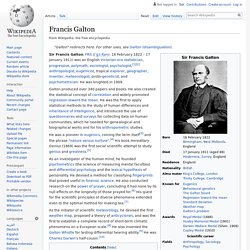
He was knighted in 1909. Galton produced over 340 papers and books. He also created the statistical concept of correlation and widely promoted regression toward the mean. He was the first to apply statistical methods to the study of human differences and inheritance of intelligence, and introduced the use of questionnaires and surveys for collecting data on human communities, which he needed for genealogical and biographical works and for his anthropometric studies. He was a pioneer in eugenics, coining the term itself[3] and the phrase "nature versus nurture".[4] His book Hereditary Genius (1869) was the first social scientific attempt to study genius and greatness.[5] Early life[edit]
Søren Kierkegaard (Stanford Encyclopedia of Philosophy) 1.

Kierkegaard’s Life Kierkegaard led a somewhat uneventful life. He rarely left his hometown of Copenhagen, and travelled abroad only five times—four times to Berlin and once to Sweden. His prime recreational activities were attending the theatre, walking the streets of Copenhagen to chat with ordinary people, and taking brief carriage jaunts into the surrounding countryside.
He was educated at a prestigious boys’ school (Borgerdydskolen), then attended Copenhagen University where he studied philosophy and theology. Sibbern and Møller were both philosophers who also wrote fiction. Another very important figure in Kierkegaard’s life was J.L. Kierkegaard’s life is more relevant to his work than is the case for many writers. In a less abstract manner, an understanding of Kierkegaard’s biography is important for an understanding of his writing because his life was the source of many of the preoccupations and repetitions within his oeuvre. 2. 3. 4. 5. 6. 7. AP Psychology Review: Psychologists in History and Methods Units. Classics in the History of Psychology. Classics in the History of Psychology An internet resource developed by Christopher D.
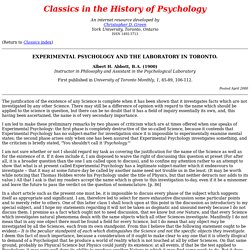
Green York University, Toronto, Ontario ISSN 1492-3713 (Return to Classics index) Albert H. Abbott, B.A. (1900)Instructor in Philosophy and Assistant in the Psychological Laboratory First published in University of Toronto Monthly, 1, 85-89, 106-112. Posted April 2000 The justification of the existence of any Science is complete when it has been shown that it investigates facts which are not investigated by any other Science.
I am not sure whether or not I should regard my task as covering the justification for the name of the Science as well as for the existence of it. In a short article such as the present one must be, it is impossible to discuss every phase of the subject which suggests itself as appropriate and significant. Classics in the History of Psychology. Ebbinghaus.wmv. Password psychology - Wikipedia. In order for a password to work successfully and provide security to its user it must be kept secret and un-guessable; this also requires the user to memorize their password.
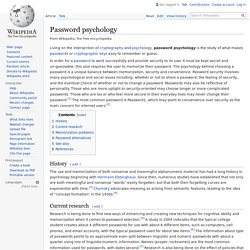
The psychology behind choosing a password is a unique balance between memorization, security and convenience. Password security involves many psychological and social issues including; whether or not to share a password, the feeling of security, and the eventual choice of whether or not to change a password. Passwords may also be reflective of personality. Those who are more uptight or security-oriented may choose longer or more complicated passwords. Those who are lax or who feel more secure in their everyday lives may never change their password.[1] The most common password is Password1, which may point to convenience over security as the main concern for internet users.[2] THE POSITIVIST REPUDIATION OF WUNDT.
Ebbinghaus. Wundt and the Founding of Psychology. Mental Imagery (Stanford Encyclopedia of Philosophy) 1.
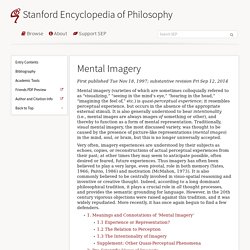
Meanings and Connotations of ‘Mental Imagery’ Mental imagery is a familiar aspect of most people's everyday experience (Galton, 1880a,b, 1883; Betts, 1909; Doob, 1972; Marks, 1972, 1999). A few people may insist that they rarely, or even never, consciously experience imagery (Galton, 1880a, 1883; Faw, 1997, 2009; but see Brewer & Schommer-Aikins, 2006), but for the vast majority of us, it is a familiar and commonplace feature of our mental lives. The English language supplies quite a range of idiomatic ways of referring to visual mental imagery: ‘visualizing,’ ‘seeing in the mind's eye,’ ‘having a picture in one's head,’ ‘picturing,’ ‘having/seeing a mental image/picture,’ and so on.
There seem to be fewer ways to talk about imagery in other sensory modes, but there is little doubt that it occurs, and the experiencing of imagery in any sensory mode is often referred to as ‘imagining’ (the appearance, feel, smell, sound, or flavor of something). 1.1 Experience or Representation? 2. 3. My Psych 190 Study Guide. Physiological Psychology.